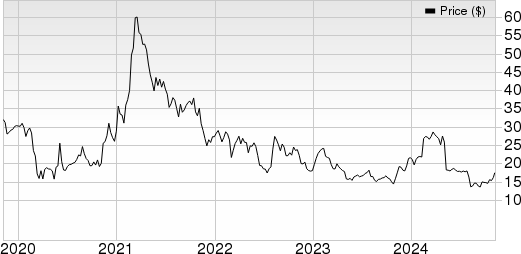When a company airs the same ad five times during the Super Bowl, it’s usually deemed a waste. Yet, for Temu, the Chinese e-commerce insurgent, this move embodies its strategy — flood the market with sheer volume at rock-bottom prices to carve a path into American homes. Temu, a subsidiary of PDD Holdings (NASDAQ: PDD), has inundated social media and web browsers with ads showcasing ultra-low-priced products, driving PDD’s stock up by over 50% in the past year. In a bid to win over price-conscious consumers, Temu is positioning itself as a viable alternative to Amazon (NASDAQ: AMZN) in the e-commerce realm.
But can Temu truly threaten Amazon’s e-commerce domination? And will it cement its presence in the U.S. market or fade into obscurity once the initial hype wanes? These questions hold clues to the long-term investment outlook of PDD’s stock.
Amazon’s History with Chinese Rivals
Temu joins a line of Chinese challengers taking on Amazon. Notably, when Alibaba‘s (NYSE: BABA) AliExpress launched in 2010, Amazon chose to stay on the sidelines. The dynamics of competing with Chinese entities in the domestic market present a formidable challenge for U.S. companies due to extensive governmental support to native firms in China. This phenomenon led Amazon to exit its e-commerce operations in China in 2019, acknowledging Alibaba’s supremacy within the country.
Although Amazon enjoyed a sales surge of 20% in 2019 post its China exit, AliExpress failed to garner mainstream appeal in the U.S., relegated to a platform for “dropshippers” seeking to resell Chinese goods on Amazon. Temu’s approach of offering the cheapest iterations of products aims to disrupt this resale model, potentially reshaping the landscape for Chinese goods sold in the U.S.

Image source: Getty Images
Despite Temu’s disruptive potential, Amazon’s stronghold on quality products and value-focused consumers remains robust. Temu’s current inventory may not align with the preferences of discerning Amazon shoppers, a factor working in Amazon’s favor.
The Perils of Investing in PDD and Temu
The road ahead for Temu and PDD is fraught with challenges that could spell uncertainty in the e-commerce domain. U.S.-China tensions pose a significant risk, mirroring the scrutiny faced by firms like ByteDance and TikTok. Regulatory clampdowns on data practices and connections to Chinese interests could jeopardize Temu’s foray into the American market.
Additionally, Temu’s financial viability raises red flags, with analysts estimating substantial annual losses due to its cutthroat pricing strategy. The company’s lack of robust warehousing infrastructure further hampers its growth trajectory, calling into question its sustainability in the competitive e-commerce ecosystem.
In the realm of reputation, Temu grapples with a tarnished image, marked by a C+ rating from the Better Business Bureau and complaints of copyright infringement and counterfeit products. This negative perception could sour consumer trust and investor confidence in the long run.
Assessing the Investment Appeal
Despite PDD Holdings’ recent stock performance, the outlook for long-term investment appears hazy. American investors face limitations as they can only access American Depository Receipts for PDD on the NYSE, restricting ownership rights. In a landscape shaped by China’s opaque business practices and regulatory influences, investing in PDD carries inherent risks.
Lack of transparent financial disclosures from PDD, coupled with institutional uncertainties, further clouds the investment proposition. For prudent investors seeking stable growth avenues, the risks associated with PDD Holdings may outweigh potential gains.
Final Thoughts on PDD Holdings
In the e-commerce arena’s clash of titans, Temu emerges as a disruptive force challenging established norms. However, amid geopolitical tensions, financial uncertainties, and reputational risks, the investment allure of PDD remains shrouded in doubt. While the allure of a David versus Goliath narrative may intrigue some, prudent investors are advised to tread cautiously in the unpredictable terrain of e-commerce investments.




